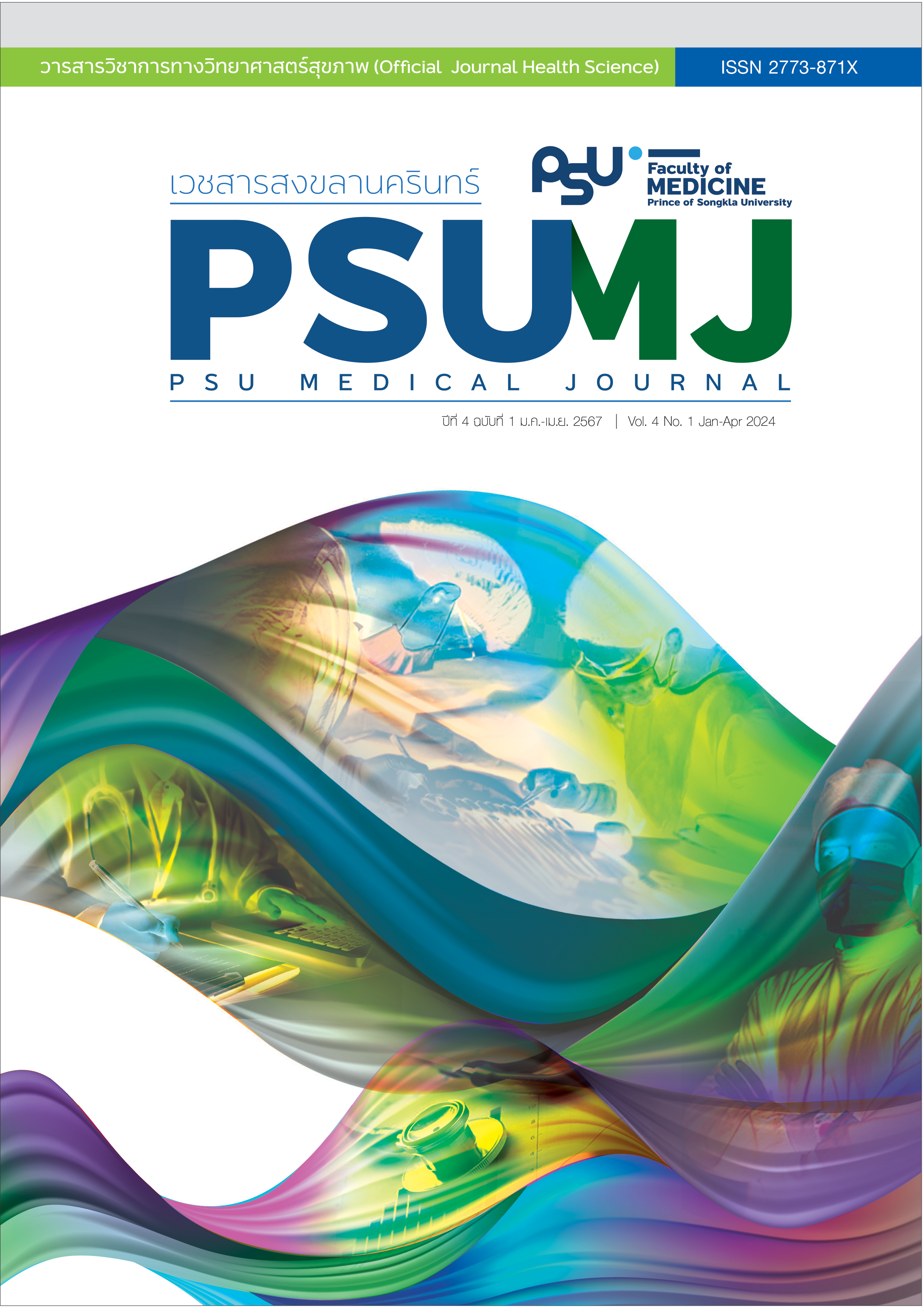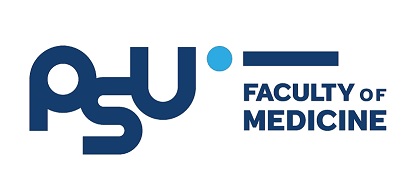Empathy Levels and Burnout in Medical Students: An Analytic Cross-Sectional Study in a Thai University Hospital
DOI:
https://doi.org/10.31584/psumj.2024264515Keywords:
burnout, empathy, medical education, medical studentAbstract
Objective: In medical education, empathy is an essential element of professionalism; however, medical students are sometimes advised to limit empathy. Excessive empathy might be linked to burnout and trigger negative consequences such as low mood and quality of life. Due to limited data regarding the association between empathy and burnout, this study aimed to examine the relationship between levels of empathy and burnout with their respective subscales, among medical students.
Material and Methods: This cross-sectional study was conducted at the clinical level of medical students currently undergoing medical training at the Faculty of Medicine, Prince of Songkla University, at the end of the 2020 academic year. Medical students aged more than 20 years who completed the questionnaires were included. The questionnaires comprised 1) demographic data, 2) The Toronto Empathy Questionnaire, 3) The Maslach Burnout Inventory (Thai version), and 4) The Thai Mental Health Indicator-15. Associations between empathy and burnout including emotional exhaustion, depersonalisation, and personal accomplishment subscales were investigated using linear regression analysis.
Results: From the three-year clinical level, 91.9% (466 of 507) of medical students completed the questionnaires, with a mean age of 23.1±1.4 years. In the linear regression analyses, empathy scores were positively associated with emotional exhaustion and negatively associated with depersonalisation and low personal accomplishment (Adjusted coefficient 0.18 (0.02, 0.33), -0.09 (-0.18, -0.01), and -0.42 (-0.52, -0.31), respectively). Among the empathy subscales, altruism was significantly correlated with personal accomplishment (r=-0.41, p-value<0.001).
Conclusion: The study revealed a negative correlation between empathy and overall burnout. While a high level of empathy was found to prevent depersonalisation and enhance personal accomplishment, it did not significantly hinder the emotional exhaustion associated with burnout. Empathy, particularly altruism, was related to personal accomplishments. Our findings suggest that empathy is a crucial determinant of burnout prevention; therefore, optimal levels of empathy should be taught to medical students during medical training to prevent emotional exhaustion. However, the evaluation of further causal explanations is recommended.
References
Hogan R. Development of an empathy scale. J Consult Clin Psychol 1969;33:307-16.
Mehrabian A, Epstein N. A measure of emotional empathy. J Pers 1972;40:525-43.
Carre A, Stefaniak N, D’Ambrosio F, Bensalah L, Besche-Richard C. The basic empathy scale in adults (BES-A): factor structure of a revised form. Psychol Assess 2013;25:679-91.
Archer E, Turner R. Empathy: an essential tool in any doctor’s skillset. S Afr Med J 2018;109:11-2.
Elam CL. Use of ‘emotional intelligence’ as one measure of medical school applicants’ noncognitive characteristics. Acad Med 2000;75:445-6.
Sathaporn K, Pitanupong J. Factors associated with the improvement of the empathy levels among clinical-year medical students in southern Thailand: a university-based cross-sectional study. BMC Psychol 2022;10:128.
Pitanupong J, Sangkool J, Wiwattanaworaset P, Pongthanawisut S, Teetharathul T, Jiraphan A. Dropout thought among medical students at faclty of medicine prince of songkla university. Thammasat Med J 2020;20:175-84.
Pitanupong J, Sathaporn K. The prevalence and factors associated with mistreatment perception among Thai medical students in a southern medical school. Siriraj Med J 2019;71:310-7.
Hojat M, Vergare MJ, Maxwell K, Brainard G, Herrine SK, Isenberg GA, et al. The devil is in the third year: a longitudinal study of erosion of empathy in medical school. Acad Med 2009;84:1182-91.
Woloschuk W, Harasym PH, Temple W. Attitude change during medical school: a cohort study. Med Educ 2004;38:522-34.
Dyrbye LN, Thomas MR, Harper W, Massie FS, Jr., Power DV, Eacker A, et al. The learning environment and medical student burnout: a multicentre study. Med Educ 2009;43:274-82.
Ramirez AJ, Graham J, Richards MA, Cull A, Gregory WM. Mental health of hospital consultants: the effects of stress and satisfaction at work. Lancet 1996;347:724-8.
Firth-Cozens J, Greenhalgh J. Doctors’ perceptions of the links between stress and lowered clinical care. Soc Sci Med 1997;44:1017-22.
Shanafelt TD, Bradley KA, Wipf JE, Back AL. Burnout and self-reported patient care in an internal medicine residency program. Ann Intern Med 2002;136:358-67.
Bellini LM, Baime M, Shea JA. Variation of mood and empathy during internship. JAMA 2002;287:3143-6.
Jumroonrojana K, Zartrungpak S. Development of the jefferson scale of physician empathy-student version (Thai version). J Psychiatr Assoc Thailand 2013;57:213-24.
Spreng RN, McKinnon MC, Mar RA, Levine B. The toronto empathy questionnaire: scale development and initial validation of a factor-analytic solution to multiple empathy measures. J Pers Assess 2009;91:62-71.
Summawart S. Burnout among the staf nurses in Ramathibodi hospital. Bangkok: Mahidol University; 1989 [cited 2023 May 16]. Available from: http://mulinet11.li.mahidol.ac.th/e-thesis/scan/18486.pdf
Maslach C, Jackson SE. The Measurement of Experienced Burnout. J Organ Behav 1981;2:99-113.
Mongkol A, Huttapanom W. Thai Happiness Indicators (THI-15) [monograph on the Internet]. Nonthaburi: Department of Mental Health, Ministry of Public Health; 2011 [cited 2023 May 16]. Available from: http://www.dmh.go.th/test/qtest/
Sathaporn K, Pitanupong J. The relationship between mental health with the level of empathy among medical students in southern Thailand: a university-based cross-sectional study. Siriraj Med J 2021;73:832-40.
Chen D, Lew R, Hershman W, Orlander J. A cross-sectional measurement of medical student empathy. J Gen Intern Med 2007;22:1434-8.
Brazeau CM, Schroeder R, Rovi S, Boyd L. Relationships between medical student burnout, empathy, and professionalism climate. Acad Med 2010;85:S33-6.
Bloom P. Empathy and its discontents. Trends Cogn Sci 2017;21:24-31.
Thirioux B, Birault F, Jaafari N. Empathy is a protective factor of burnout in physicians: new neuro-phenomenological hypotheses regarding empathy and sympathy in care relationship. Front Psychol 2016;7:763.
Pitanupong J, Sathaporn K, Ittasakul P, Karawekpanyawong N. Relationship of mental health and burnout with empathy among medical students in Thailand: a multicenter cross-sectional study. PLoS One 2023;18:e0279564.
Figley CR. Compassion fatigue: coping with secondary traumatic stress disorder in those who treat the traumatized. 1st ed. New York: Routledge; 1995.
Sinclair S, Raffin-Bouchal S, Venturato L, Mijovic-Kondejewski J, Smith-MacDonald L. Compassion fatigue: a meta-narrative review of the healthcare literature. Int J Nurs Stud 2017;69:9-24.
Paro HB, Silveira PS, Perotta B, Gannam S, Enns SC, Giaxa RR, et al. Empathy among medical students: is there a relation with quality of life and burnout?. PLoS One 2014;9:e94133.
Lopes AR, Nihei OK. Burnout among nursing students: predictors and association with empathy and self-efficacy. Rev Bras Enferm 2020;73:e20180280.
Delgado N, Bonache H, Betancort M, Morera Y, Harris LT. Understanding the links between inferring mental states, empathy, and burnout in medical contexts. Healthcare (Basel) 2021;9.
Thomas MR, Dyrbye LN, Huntington JL, Lawson KL, Novotny PJ, Sloan JA, et al. How do distress and well-being relate to medical student empathy? a multicenter study. J Gen Intern Med 2007;22:177-83.
Picard J, Catu-Pinault A, Boujut E, Botella M, Jaury P, Zenasni F. Burnout, empathy and their relationships: a qualitative study with residents in general medicine. Psychol Health Med 2016;21:354-61.
Shanafelt TD, West C, Zhao X, Novotny P, Kolars J, Habermann T, et al. Relationship between increased personal well-being and enhanced empathy among internal medicine residents. J Gen Intern Med 2005;20:559-64.
Hirsch EM. The role of empathy in medicine: a medical student’s perspective. Virtual Mentor 2007;9:423-7.
Hojat M. Empathy in patient care: antecedents, development, measurement, and outcomes. New York: Springer; 2007.
Downloads
Published
How to Cite
Issue
Section
License
Copyright (c) 2024 Author and Journal

This work is licensed under a Creative Commons Attribution-NonCommercial-NoDerivatives 4.0 International License.








